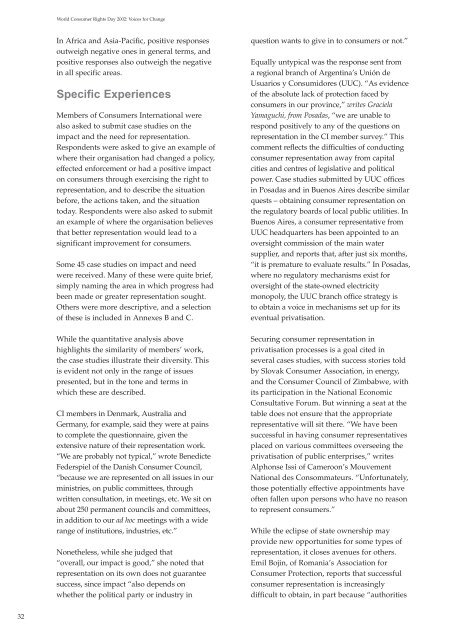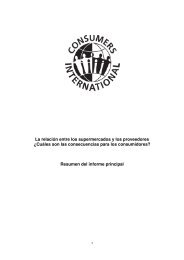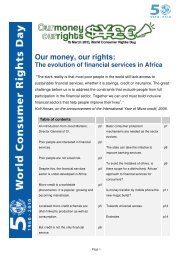Voices for Change: the Consumer Right to Representation
Voices for Change: the Consumer Right to Representation
Voices for Change: the Consumer Right to Representation
Create successful ePaper yourself
Turn your PDF publications into a flip-book with our unique Google optimized e-Paper software.
32<br />
World <strong>Consumer</strong> <strong>Right</strong>s Day 2002: <strong>Voices</strong> <strong>for</strong> <strong>Change</strong><br />
In Africa and Asia-Pacific, positive responses<br />
outweigh negative ones in general terms, and<br />
positive responses also outweigh <strong>the</strong> negative<br />
in all specific areas.<br />
Specific Experiences<br />
Members of <strong>Consumer</strong>s International were<br />
also asked <strong>to</strong> submit case studies on <strong>the</strong><br />
impact and <strong>the</strong> need <strong>for</strong> representation.<br />
Respondents were asked <strong>to</strong> give an example of<br />
where <strong>the</strong>ir organisation had changed a policy,<br />
effected en<strong>for</strong>cement or had a positive impact<br />
on consumers through exercising <strong>the</strong> right <strong>to</strong><br />
representation, and <strong>to</strong> describe <strong>the</strong> situation<br />
be<strong>for</strong>e, <strong>the</strong> actions taken, and <strong>the</strong> situation<br />
<strong>to</strong>day. Respondents were also asked <strong>to</strong> submit<br />
an example of where <strong>the</strong> organisation believes<br />
that better representation would lead <strong>to</strong> a<br />
significant improvement <strong>for</strong> consumers.<br />
Some 45 case studies on impact and need<br />
were received. Many of <strong>the</strong>se were quite brief,<br />
simply naming <strong>the</strong> area in which progress had<br />
been made or greater representation sought.<br />
O<strong>the</strong>rs were more descriptive, and a selection<br />
of <strong>the</strong>se is included in Annexes B and C.<br />
While <strong>the</strong> quantitative analysis above<br />
highlights <strong>the</strong> similarity of members’ work,<br />
<strong>the</strong> case studies illustrate <strong>the</strong>ir diversity. This<br />
is evident not only in <strong>the</strong> range of issues<br />
presented, but in <strong>the</strong> <strong>to</strong>ne and terms in<br />
which <strong>the</strong>se are described.<br />
CI members in Denmark, Australia and<br />
Germany, <strong>for</strong> example, said <strong>the</strong>y were at pains<br />
<strong>to</strong> complete <strong>the</strong> questionnaire, given <strong>the</strong><br />
extensive nature of <strong>the</strong>ir representation work.<br />
“We are probably not typical,” wrote Benedicte<br />
Federspiel of <strong>the</strong> Danish <strong>Consumer</strong> Council,<br />
“because we are represented on all issues in our<br />
ministries, on public committees, through<br />
written consultation, in meetings, etc. We sit on<br />
about 250 permanent councils and committees,<br />
in addition <strong>to</strong> our ad hoc meetings with a wide<br />
range of institutions, industries, etc.”<br />
None<strong>the</strong>less, while she judged that<br />
“overall, our impact is good,” she noted that<br />
representation on its own does not guarantee<br />
success, since impact “also depends on<br />
whe<strong>the</strong>r <strong>the</strong> political party or industry in<br />
question wants <strong>to</strong> give in <strong>to</strong> consumers or not.”<br />
Equally untypical was <strong>the</strong> response sent from<br />
a regional branch of Argentina’s Unión de<br />
Usuarios y Consumidores (UUC). “As evidence<br />
of <strong>the</strong> absolute lack of protection faced by<br />
consumers in our province,” writes Graciela<br />
Yamaguchi, from Posadas, “we are unable <strong>to</strong><br />
respond positively <strong>to</strong> any of <strong>the</strong> questions on<br />
representation in <strong>the</strong> CI member survey.” This<br />
comment reflects <strong>the</strong> difficulties of conducting<br />
consumer representation away from capital<br />
cities and centres of legislative and political<br />
power. Case studies submitted by UUC offices<br />
in Posadas and in Buenos Aires describe similar<br />
quests – obtaining consumer representation on<br />
<strong>the</strong> regula<strong>to</strong>ry boards of local public utilities. In<br />
Buenos Aires, a consumer representative from<br />
UUC headquarters has been appointed <strong>to</strong> an<br />
oversight commission of <strong>the</strong> main water<br />
supplier, and reports that, after just six months,<br />
“it is premature <strong>to</strong> evaluate results.” In Posadas,<br />
where no regula<strong>to</strong>ry mechanisms exist <strong>for</strong><br />
oversight of <strong>the</strong> state-owned electricity<br />
monopoly, <strong>the</strong> UUC branch office strategy is<br />
<strong>to</strong> obtain a voice in mechanisms set up <strong>for</strong> its<br />
eventual privatisation.<br />
Securing consumer representation in<br />
privatisation processes is a goal cited in<br />
several cases studies, with success s<strong>to</strong>ries <strong>to</strong>ld<br />
by Slovak <strong>Consumer</strong> Association, in energy,<br />
and <strong>the</strong> <strong>Consumer</strong> Council of Zimbabwe, with<br />
its participation in <strong>the</strong> National Economic<br />
Consultative Forum. But winning a seat at <strong>the</strong><br />
table does not ensure that <strong>the</strong> appropriate<br />
representative will sit <strong>the</strong>re. “We have been<br />
successful in having consumer representatives<br />
placed on various committees overseeing <strong>the</strong><br />
privatisation of public enterprises,” writes<br />
Alphonse Issi of Cameroon’s Mouvement<br />
National des Consommateurs. “Un<strong>for</strong>tunately,<br />
those potentially effective appointments have<br />
often fallen upon persons who have no reason<br />
<strong>to</strong> represent consumers.”<br />
While <strong>the</strong> eclipse of state ownership may<br />
provide new opportunities <strong>for</strong> some types of<br />
representation, it closes avenues <strong>for</strong> o<strong>the</strong>rs.<br />
Emil Bojin, of Romania’s Association <strong>for</strong><br />
<strong>Consumer</strong> Protection, reports that successful<br />
consumer representation is increasingly<br />
difficult <strong>to</strong> obtain, in part because “authorities






![pkef]Qmf eg]sf] s] xf] < - Consumers International](https://img.yumpu.com/6479658/1/184x260/pkefqmf-egsf-s-xf-consumers-international.jpg?quality=85)
